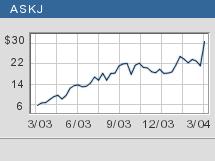
SAN FRANCISCO (CNN/Money) -
Ask Jeeves has just joined the rarefied "40 Club." I'm talking about the select group of Internet companies that have seen their stock prices rise by 40 percent in one day.
Back in the late 1990s, the club wasn't all that exclusive, but membership is very low this year, consisting primarily of a few Chinese portal sites.
So why did Ask Jeeves's stock take off last week? The company announced that it was acquiring Interactive Search Holdings, a company with a portfolio of high-traffic sites such as Excite.com, iWon.com, and MySearch.com, for $150 million in cash and 9.3 million shares of stock. The deal was valued at approximately $343 million at the time it was announced.
Ask Jeeves's stock shock notwithstanding, privately held ISH is a big winner here, since it acquired the Excite.com site in November 2001 for a mere $10 million as part of a three-way deal with Infospace. Not a bad return on investment for the Irvington, N.Y., firm.
Is it worth it?
But does the acquisition of a few decent, if not spectacular, sites justify the kind of gains Ask Jeeves (ASKJ: Research, Estimates) reaped? It's hard to rationalize any 40 percent stock gain, but the purchase does keep Jeeves in the search game.

"It was a smart move on their part," says Susan Feldman, an analyst with IDC. Compared with some of the leading Internet companies, Jeeves is priced relatively sensibly -- even after the 40 percent gain. It's trading at a future price/earnings ratio of roughly 36. Yahoo! is at 60 and eBay stands at 50.
The purchase essentially doubles Jeeves's share of the search market, from about 3.5 percent to 7 percent.
"It's been our strategy for a while now to grow our market share," says Steve Sordello, CFO of Ask Jeeves. In doing so, Jeeves closes the market share gap between it and No. 4, AOL.
While competitors such as Yahoo! (YHOO: Research, Estimates) and AOL raced to add every feature under the sun to their sites, Jeeves went the Google route, sticking primarily to search. That was a smart move; search is now where the money is. Advertisers spent $2.3 billion on keyword-search advertising in the last year, according to a recent study by J.P. Morgan. AOL, like CNN/Money, is owned by Time Warner (TWX: Research, Estimates).
| Recently in Tech Biz
|

|
|
|
|
It's pretty simple: The more traffic you can deliver, the more advertisers you will attract. By that math, Jeeves is now twice as attractive to advertisers as it was before the deal.
"This allows us to be much more valuable to advertisers," Sordello confirms.
Can the butler do it?
I've never been a fan of Jeeves. I find its butler mascot annoying, its technology inferior to Google's, and its direction listless. I always predicted that it would be the next big search property to go belly-up.
But I have to hand it to the company -- it's done some very smart things to stay alive. It greatly improved its Teoma search technology in January 2003, when the focus of the market was on search quality, and the ISH acquisition buys it more time as an ongoing concern.
"We're seeing a grand sorting out of the search market," Feldman says. "If Ask Jeeves wanted to stay in the market, they needed to add to their holdings."
But with Google expected to go public soon, and Yahoo! and Microsoft (MSFT: Research, Estimates) redoubling their efforts in the search space, the billion-dollar question facing Ask Jeeves is, How much longer can the search market support a fifth-place company? Investors need to square that question before buying the stock today.
Sign up to receive the Tech Investor column by e-mail.
Plus, see more tech commentary and get the latest tech news.

|

